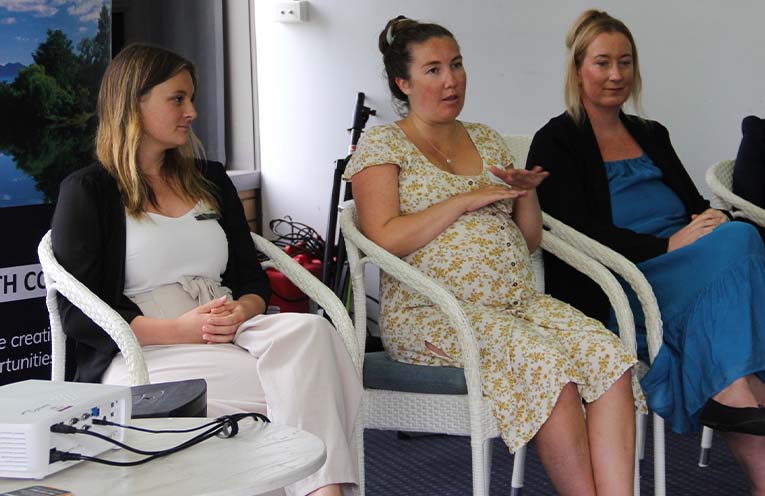
A CHILDCARE crisis is gripping the Mid North Coast, with just 65 percent of early childhood education and care demand being met.
According to research from Regional Development Australia Mid North Coast (RDAMNC), parents across the region are struggling to gain access to childcare, while providers battle chronic staff shortages.
 Advertise with News of The Area today.
Advertise with News of The Area today.It’s worth it for your business.
Message us.
Phone us – (02) 4981 8882.
Email us – media@newsofthearea.com.au
Speaking at the Ignite Mini event in Bellingen on February 8, RDAMNC Chief Operations Officer Dianne Wall said the situation on the Mid North Coast was “critical”.
“However, it is a national problem as well,” she said.
“One thing that has really been highlighted to us is the value of the role that early childhood education and care plays in the broader economic environment.
“It has been grossly undervalued.”
An RDAMNC survey of childcare operators on the Mid North Coast indicated that just 52 percent of providers accept babies under the age of one.
“That increased to 58 percent for one-year-olds and up to 79 percent for two-year-olds, compared to 93 percent for three- to four-year-olds,” Ms Wall said.
The research showed that 87.5 percent of providers have waitlists, while 25 percent of providers are operating under their approved limits due to staff shortages.
Childcare operators across the region are struggling to attract and retain staff, with 56 percent of providers surveyed having positions vacant.
Of those providers, 33 percent have been trying to fill those positions for more than twelve months.
“Staffing really is a big issue for the sector,” Ms Wall said.
A further survey of Mid North Coast parents showed that 92 percent of respondents had a child under two requiring early childhood education and care.
52 percent of respondents said they were not able to get access to childcare.
91 percent of respondents indicated they were on a waitlist, with many on multiple waitlists.
“When we averaged it out there was 4.7 waitlists per family,” Ms Wall said.
RDAMNC says the situation is leaving local families without choice, forcing parents to turn down employment opportunities to care for their children.
“85 percent of respondents either needed to or wanted to be working more hours,” Ms Wall said.
With the stark reality of the crisis laid bare, last week’s Ignite forum attendees then turned their attention to finding solutions.
Sarah O’Carrigan, a personal trainer from the Blue Mountains, spoke of her experience launching Bub Hub, a co-working space and creche which allows parents to engage in employment while accessing convenient childcare.
Operating out of OOSH buildings, the service is community-led and responds to the need for more flexible, affordable and accessible forms of work and childcare.
Bellingen Deputy Mayor Ellie Tree and community member Holly Quinn then joined Ms O’Carrigan on a panel discussion to discuss their experiences attempting to access consistent childcare in the region.
Ms Tree spoke to the difficulty of accessing limited childcare resources across a vast geographical area.
“I did my own experiment and was on 30 waitlists from Macksville to Coramba,” Ms Tree said.
“The problem I was finding is that you could get offered a day (of childcare) 50 kilometres north, and then two days 20 kilometres south.
“You just can’t, it is not possible to do it that way.”
Ms Quinn, who is a recent arrival in the region from Sydney, touched on the differences between services offered in regional and metropolitan areas.
“In Sydney, there is still issues with access, but as an example where I lived in the Eastern Suburbs, you had to put your child on the waitlist a year to six months in advance, but there was five daycare centres within walking distance, so there is more choice,” she said.
“Where I am now there is one childcare centre in Nambucca, otherwise you need to go to Macksville or Urunga.
“I also think childcare in Sydney is more tailored to working families.
“Most daycare centres take kids from six weeks onwards, they provide meals, they are open later hours.
“A lot of the preschools in this area, which are absolutely beautiful and community run, close in the school holidays.
“It is really tough.”
The speakers also addressed the need to reframe access to childcare as a social justice issue.
“It is setting gender equity back a long way,” Ms O’Carrigan said.
At the end of January, the Australian Competition and Consumer Commission (ACCC) Childcare Inquiry released a report with considerations for government childcare interventions in regional, rural and remote communities.
The report recognises that Australia’s current policy settings do not deliver on key policy objectives of accessibility and affordability in areas where profitably and viability are not secure enough for service provision.
The ACCC recommends that governments adopt a “broad” and “more active” market stewardship role to oversee, manage and assist the delivery of services across the country.
The Parenthood, a leading Australian parent advocacy group, welcomed the report.
“Right now, the market is failing regional, rural and remote communities, where demand may be low and there are labour shortages,” said Maddy Butler, Campaign Director of The Parenthood.
“If the market won’t provide, governments must step in as market stewards to ensure every single child – no matter if they live in Broome, in Cunnamulla, or in Melbourne – can access some form of early learning and care.
“We welcome the ACCC’s recommendation for further consideration of supply-side funding.
“Demand-side funding does not support the ongoing sustainability of a service, particularly in more rural and remote areas, which is a clear indicator that other funding models are required,” said Butler.
“A range of supply-side subsidies, as considered in the ACCC final report, would support the rollout of more services in under-served and unserved areas.
“Australia is a vast country, and differing regions have differing challenges and needs.
“Governments must look beyond a ‘one size fits all’ approach and implement a suite of measures and interventions which support and embrace the specific needs of each area.
“Community consultation will be a key part of this process.”
By Doug CONNOR
